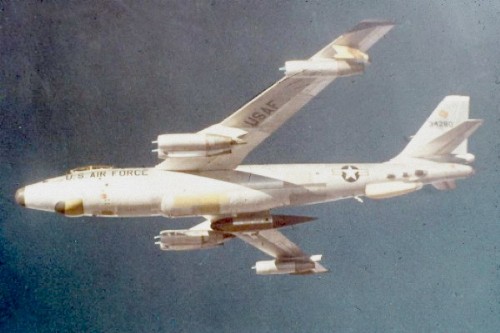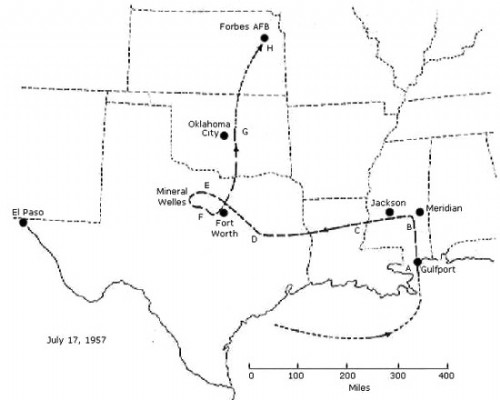
Date: July 17, 1957
Location: Gulf Coast Area, USA
On board an RB-47H aircraft equipped with sophisticated electronic
countermeasures equipment, over the Gulf of Mexico.
The crew consisted of:
Lewis D. Chase, pilot, Spokane, WA
James H. McCoid, copilot, Offutt AFB
Thomas H. Hanley, navigator, Vandenberg AFB
John J. Provenzano, No. 1 monitor, Wichita, KS
Frank B. McClure, No. 2 monitor, Offutt AFB
Walter A. Tuchscherer, No. 3 monitor, Topeka, KS
These six men were on a training/test exercise in an RB-47H electronic
countermeasures reconnaissance aircraft. The RB-47, while originally developed
as a bomber, was also used extensively as a reconnaissance aircraft. One was
shot down by the Soviet Union while on such a mission in 1960.
This particular mission began at Forbes AFB in Topeka, Kansas as an exercise
including gunnery exercises over the Texas-Gulf area, navigation exercises over
the open Gulf, and Electronic CounterMeasures exercises on the return trip
across the south-central U.S.

The men participating were soon to depart for Germany and duty there. It should
be noted that the ECM equipment was not radar. It did not emit a signal and
then pick up reflected echoes off of an object. Rather, it detected
electromagnetic signals that were actually emitted by an object itself. The
purpose of this was to detect and locate enemy radar installations.
On this
aircraft, the #2 monitor consisted of a direction finder with antenna on the
lower rear of the aircraft, and the #1 monitor consisted of a direction finder
with antennas on each wingtip of the aircraft. The #3 monitor was not involved
in the events of July 17, because its range did not include the frequencies
involved. The first contact with the unknown object was before 4:00 AM CST. The
first two parts of the mission had been completed, and the aircraft was just
leaving the airspace over the Gulf of Mexico near Gulfport, Mississippi, when
Frank McClure, on the #2 ECM monitor, detected an airborne signal to the right
rear of the aircraft, out over the Gulf of Mexico.
The signal was of a type
usually confined to ground-based radar installations. It was at 2800
megacycles, a common frequency for S-band search radar. McClure at first
thought that his scope must be 180° out of alignment and that he must be
picking up a ground-based radar station in Louisiana, which would actually be
to the left front of the aircraft. As he watched, the signal moved up the
scope, as it would if the scope was 180° out of alignment.
However, he was
amazed to see that, after it had moved up the scope on the right-hand side of
the aircraft, it then crossed the path of the RB-47 and proceeded to move down
the scope on the left-hand side. In other words, whatever was emitting the
signal flew a ring around the RB-47, which was flying at approximately 500 mph.
Even if the scope was 180° out of alignment, the signal source still moved
completely around the aircraft, which no ground radar could do. McClure said
and did nothing at this time, not mentioning the signal to the other crew
members. The signal faded as they flew north.
The RB-47 made a scheduled turn to the west over Jackson, Mississippi and the
crew was preparing to begin a series of simulated ECM operations against Air
Force ground radar units, when suddenly the pilot, Lewis Chase, saw a light
coming in from the left, at approximately the same altitude as the RB-47. At
first he thought it was another plane, but it was only a single white light,
closing fast. He gave the command to prepare for evasive maneuvers, but the
light flashed across from left to right so fast that no such action could have
been taken. It then blinked out at a point to the right front of the aircraft.
Both Chase and Copilot James McCoid observed this. At this point, approximately
4:10 AM CST, they were approximately over Winnsboro, Louisiana.
Chase told the other crewmembers what he had seen, and McClure now told him
about his earlier signal reading. At 4:30 AM, McClure set his scope to detect
signals near 3000 mcs again, and he detected a strong signal at the same
location in relation to the RB-47 that Chase had last seen the light. He and
Provenzano checked the alignment of the #2 monitor by tuning in on known ground
radar installations and found it to be in perfect working order. At 4:30 AM,
Provenzano tuned his own monitor, #1, to 3000 mcs, and found that his equipment
detected a signal at the same location. What's more, he and McClure found that
the signal was staying in the same position, keeping pace with the RB-47, which
was still flying at 500 mph. This meant that it was not a signal from a
ground-based radar.
The Unknown Companion
By this time they had reached the Duncanville, Texas area. At 4:39, Chase
spotted a huge light to the right front of the RB-47 an about 5,000 feet below
the aircraft's 34,500 feet altitude. The weather was perfectly clear. At 4:40,
McClure reported two signals, at 40° and 70°. Chase and McCoid reported seeing
red lights at those locations. Chase contacted radar Station Utah at
Duncanville, Texas and requested permission to abandon his flight plan and
pursue the lights, which he received. At 4:48 AM, radar station Utah requested
the position of the signals that McClure was receiving, and they immediately
confirmed that their radar had detected the objects at the same location. As
the RB-47 attempted to pursue, the object appeared to stop suddenly. Chase
could see that they were gaining on it, and they over shot it.
At 4:52 it blinked out, and simultaneously vanished from McClure's scope and
the ground radar! Chase put the aircraft into a port turn, and the object
suddenly blinked on again, simultaneously reappearing on McClure's scope and
the ground radar at 4:52! They began to close to within 5 miles of the object,
when it suddenly dropped to 15,000 feet and then blinked out again, once again
vanishing from the scopes and ground radar. At 4:55, Chase radioed Utah radar
station that they had to break of pursuit and continue with their scheduled
flight plan due to low fuel. At 4:57 McClure picked up the signal again, and at
4:58 Chase made visual contact again. As they headed into Oklahoma, McClure
continued to receive a signal, now from the rear of the aircraft, until it
finally faded as they neared Oklahoma City. The Director of Intelligence, 55th
Strategic Reconnaissance Wing, stated in his report that he had: ...no doubt
the electronic D/F's coincided exactly with visual observations by aircraft
cmdr numerous times, thus indicating positively the object being the signal
source.
What can be detected on ECM direction finding devices, can be seen visually,
and can be detected on ordinary ground-based radar all at the same time? What
can be detected by all the sensors and can also fly rings around a jet
travelling at 500 mph?
Project Bluebook said that the sightings in Dallas - Fort Worth area were an
ordinary jet airliner. They couldn't explain the abrupt, simultaneous
disappearance and reappearance of the object from radar screens, ECM scopes,
and visual detection. They also couldn't explain the events that occurred over
Mississippi and Louisiana. It's odd that the Utah radar station couldn't tell
an airliner from an unknown.
The Condon Committee toyed with several explanations, but found none to be satisfactory, finally classifying this case as unknown.
Sources and references: The RB-47 UFO Encounter - UFO evidence
James E. McDonald, "Twenty-Two Years of Inadequate UFO Investigations" (1969)
This case study by atmospheric physicist -- and leading UFO researcher -- James E. McDonald is excerpted from his paper presented at the American Association for the Advancement of Science (AAAS) UFO Symposium, 1969. R
RB-47 UFO Case Study
James E. McDonald, PhD., Astronautics & Aeronautics, July 1971
Case report on the RB-47 UFO encounter, by Dr. James E. McDonald, for the UFO subcommittee of the American Institute of Aeronautics and Astronautics (AIAA).
The RB-47 radar visual multiple witnesses cases, July 17, 1957
UFOs at Close Sight (Ufologie.net)
Articles, background, and further references for the RB-47 encounter.
Roy Craig, in the Condon Report, 1968
Roy Craig, in the Condon Report, 1968
The RB-47 incident was one of the cases examined by the University of Colorado UFO study (the Condon Report), with Roy Craig as investigator of the case.
On ATS:
Top 100 UFO Cases - Revealed! - By Isaac Koi
Special thanks to Isaac Koi for providing me with informations and sources about this case, thank you, Isaac
oo
No comments:
Post a Comment